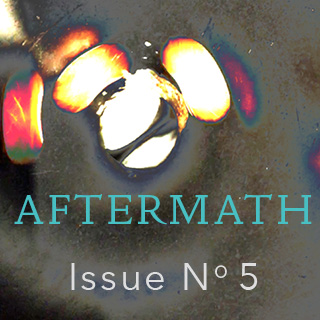150 years ago I’d be in enemy territory. South of the Mason-Dixon, here on the lip of the Piedmont Plain. My families fought here, some of their bones didn’t make it back up North. But the old beef farmer, whose cattle pick at the dry weeds in their pasture opposite our driveway, plowed up an acre of his land for me, pleased, I thought, to see it productive again. I watched him stop and throw bits of metal fencing out of the disk harrow’s path, leaning on the knee of his worn overalls. We are in a two-month drought. The creek where his cattle waded, where I looked for water moccasins, now weaves low and wretched through the crisp ragweed, gathering algae colonies in the deep cut-bank eddies. To the north many forests are burning. The fires rage through hundreds of parched acres, withered by drought. The smoke falls into this bowl of a valley, choking my throat, turning sunsets sickly pink. People stop and take pictures of the light. In the morning I wake and burn brush in the new, plowed field. The soil is dust already. It seems like the right way to start, claiming gardens from the wilderness of neglect. The puppy has learned his name. He comes running to me through the billows of black, grass fire smoke. I read that the Druids lit bonfires on Samhain, and passed the young cattle and sheep between the smoking piers to cleanse them. It is that season. The dead walk briefly in the living world. But the Romans recorded the Druids’ rituals, and history, I remind myself, is written by victors. After I burn I rake the ashes over the earth. I sow rye from my palm like the ancients. I can’t bear the thought of the drive to Wal-Mart where I could buy a grass-seeder and finish this job by noon. Instead, I sweep my hand back and forth, blessing, blessing. A great black flock of starlings shift and sweep like scattered equations, or curses in the smoke. They don’t land on my field. Instead, they scratch at the dry pasture where the cattle haven’t bothered to forage for weeks, or crowd the skirts of the persimmon trees where the opaled fruit has grown sweet with rot. The first frost blackens the sweet potato vines but I dug them already. One was shaped like a lightning bolt, charging straight into the red earth. Then suddenly, with no warning from the forecast, Sunday dawns grey and damp. A steady cold rain quiets the dust. The starlings keep to their roost. At night the clouds slip away and waves of smoke sink into the basin. A super moon, closer to Earth than any in decades, rising over the pasture, over the low smoke, thick as gunpowder. A witching hour. At dawn I wait for the frost to leave the shadows. Holding a translucent rye seed to the light I see the tail of germination, fattening the husk.
Megan Baxter
Megan Baxter is currently an MFA candidate at Vermont College of Fine Art. She coaches Crossfit and tends to a small, backyard farm. Recently, her work has appeared in Skirt! Magazine and The Open Bar at Tin House.
READ THE REST OF ISSUE NO. 5.
CONTENTS
Editor’s Note
Aftermath Stories
Leave Your Drawings in this House
Fandanguillo
The Enormity




